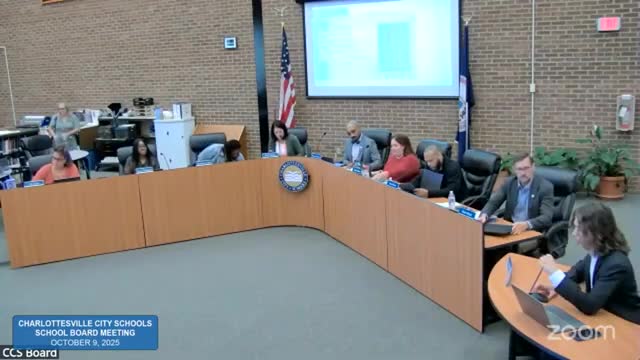School board staff present revised SRO MOU; plan to pilot two officers and publish SOP
Get AI-powered insights, summaries, and transcripts
Subscribe
Summary
Charlottesville City Schools staff presented a revised memorandum of understanding intended to pilot two sworn school resource officers, add NYCLU‑inspired student protections and publish a standard operating procedure about how SROs would operate in city schools.
Charlottesville City Schools staff presented a substantially revised memorandum of understanding (MOU) on bringing sworn school resource officers (SROs) into city schools, proposing a pilot staffed by two officers, clearer student-protective language, and an accompanying standard operating procedure (SOP) to be published in mid‑October.
The updated MOU, described by district staff during the meeting, would place one SRO at the high school and one at the middle school; both officers would be able to “float” to serve Lugo McGinnis Academy and other sites as needed. The school division said the Charlottesville Police Department will fill the pilot by repurposing two existing vacant positions and will not request new funding to add personnel.
District presenters said the new draft includes explicit protections and accountability measures influenced by the New York Civil Liberties Union (NYCLU) model and clarifies circumstances that would pause or terminate the agreement. That automatic pause would be triggered if the police department came under federal operational control or if the department engaged in immigration enforcement that involved sharing students’ or families’ immigration status. The school-side team also said an SOP will be released to explain operational detail—the SOP was scheduled for publication around Oct. 15.
The MOU adds a requirement that Charlottesville City Schools co‑select SROs in partnership with the Charlottesville Police Department, and that training, supervision and evaluation be a shared responsibility. Required training areas listed in the MOU include de‑escalation, conflict resolution, trauma‑informed responses, implicit bias, cultural diversity, working with students with disabilities, mental‑health needs, substance use disorders and child and adolescent development.
District staff said the MOU will require quarterly data reporting from CPD on youth interactions and that every instance of “official contact” by an SRO with a student—defined in the draft as questioning for law‑enforcement purposes, detaining, citation or arrest—must be logged and reviewed by school administrators. The updated draft also adds a public complaint and reporting pathway and a public reporting section that the presenters said will support ongoing program evaluation.
School board members and community speakers pressed for more detail on day‑to‑day SRO duties, body‑worn camera rules and evaluation rubrics. The presenters said the SOP will provide examples and operational detail on how and when SROs would be asked to act and that the SOP will address camera use consistent with CPD policy while protecting student privacy.
No board action to adopt the MOU or SOP was taken at the meeting; staff framed the current draft as an updated public working version and the SOP as a forthcoming implementation document. District staff invited continued community feedback through the web survey and planned public info sessions already under way.
Why this matters: The MOU discussion follows months of community engagement and student outreach. The draft attempts to balance community concerns about armed officers and civil‑liberties protections with requests from some parents and staff for an on‑site police presence for safety. The SOP and continued data reporting are presented as the mechanisms for translating policy language into operational limits and safeguards.
